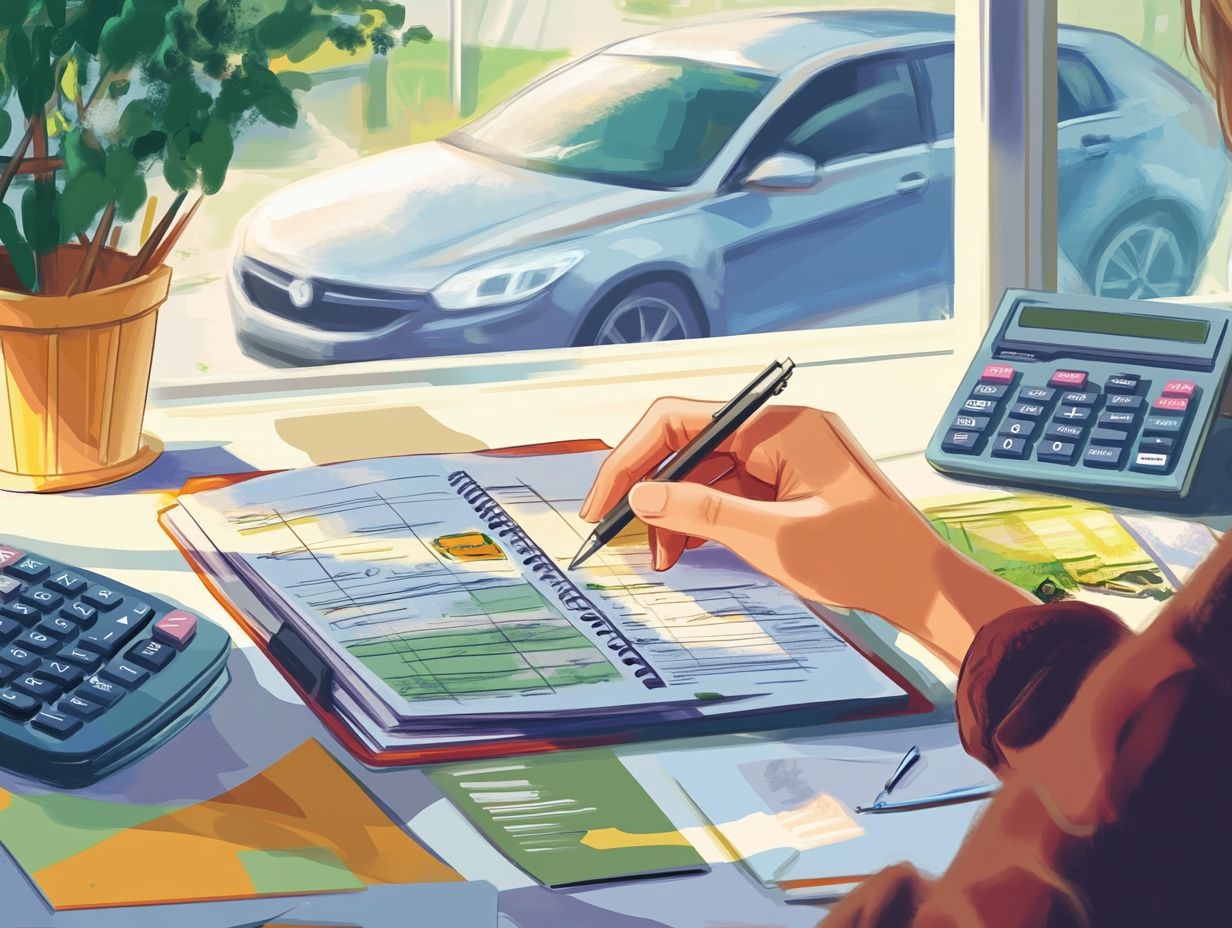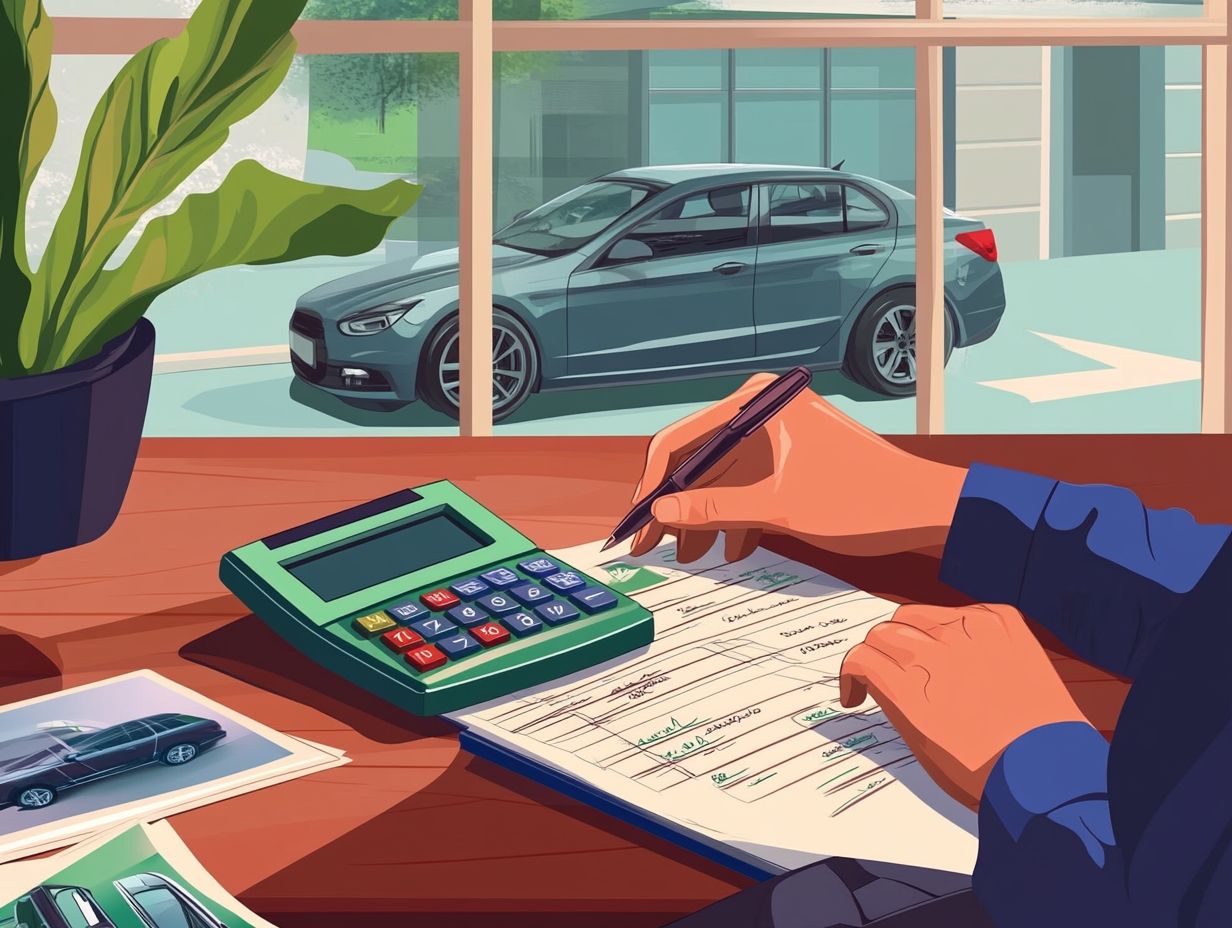How to Budget for Your New Car Purchase
Buying a new car can be an exhilarating journey, but it often feels overwhelming without a well-structured plan in place.
This guide will help you navigate the process by first encouraging you to assess your financial situation and calculate a realistic budget. You ll explore essential factors to consider when researching and comparing cars, followed by effective negotiation tips that ensure you secure the best deal.
Whether you’re a first-time buyer or ready to upgrade, this guide equips you with everything you need to make informed decisions.
Contents
- Key Takeaways:
- Assessing Your Financial Situation
- Researching and Comparing Cars
- Negotiating for the Best Deal
- Preparing for Additional Costs
- Finalizing Your Purchase
- Frequently Asked Questions
- How do I determine my budget for a new car purchase?
- What is the 20/4/10 rule for budgeting for a new car purchase?
- Should I consider buying a used car to save money on my budget?
- What other expenses should I budget for in addition to the car’s price?
- Is it better to pay for a car in cash or finance it?
- How can I save money on my car budget?
Key Takeaways:

- Kickstart your journey by calculating your complete budget don t just look at the car price.
- Research and compare cars based on price, features, and reliability.
- Negotiate for the best deal and understand loan options before finalizing your purchase.
- Be prepared for extra costs such as insurance, maintenance, and registration.
- Double-check all details before finalizing your purchase to avoid surprises.
Assessing Your Financial Situation
Assessing your financial situation is the essential first step in your car-buying journey. It sets the stage for a budget that truly reflects your financial goals, taking into account your monthly income, savings, and the various costs associated with owning a vehicle. For a comprehensive approach, consider reviewing the essentials of setting a car financing budget.
Understanding your financial capacity will help you decide between a new car and a used one and inform your choices on down payment and loan options. By incorporating tips for efficient car maintenance budgeting, you can stay comfortably within your budget and avoid unexpected repairs and hidden costs.
Calculating Your Budget
Calculating your budget is crucial for understanding how much you can comfortably spend on a vehicle. To make informed decisions, learn how to prepare for a new car purchase by considering your monthly income, down payment, and ongoing expenses like car payments and insurance premiums.
To make this process more manageable, adopt the 20/4/10 rule, a valuable guideline for savvy car buyers wanting a balanced budget. According to this rule, your total vehicle expenses, including financing, insurance, and maintenance, should never exceed 20% of your gross monthly income. Additionally, it’s wise to prepare for new car ownership by financing the vehicle over no more than four years to minimize interest payments.
Aim to keep the purchase price of your new car at no more than 10% of your annual income. To enhance your buying experience, consider looking into how to prepare for a car purchase negotiation. This keeps you stable and lets you enjoy your new ride!
Considering Other Expenses
Budgeting for a car? Don’t just focus on the purchase price; there are exciting factors to consider! To make an informed decision, check out how to finance a new car purchase and look beyond the initial cost to account for car insurance, maintenance, fuel, and potential repair expenses that can arise during ownership.
These expenses can accumulate quickly, making it imperative to factor them into your budget. For instance, car insurance premiums vary based on your driving history and the make and model of your vehicle. Shop around to find the best rates that suit your needs.
Routine maintenance, like oil changes, tire rotations, and brake checks, can add up over time. Keeping careful records is essential. An unexpected repair might arise, whether it s a flat tire or a major engine issue. Set aside an emergency fund for these incidents to ease your financial burden.
Being aware of these financial considerations will help you cultivate a more realistic understanding of the true cost of car ownership.
Researching and Comparing Cars
Researching and comparing cars is an essential step in your car shopping journey. It gives you the power to evaluate your choices between a new vehicle and a used one while factoring in crucial elements that could influence your decision.
Consider financing options, ownership costs, and your unique needs as you navigate this important process.
Factors to Consider

When comparing cars, consider several key factors. These include the vehicle’s price, financing rates, lifestyle changes that could impact your choice, and specific family needs that might dictate your selection.
It s crucial to think about how often you travel and the types of journeys you undertake be it your daily commute, school runs, or weekend getaways. The size of your family can also be significant; a growing household might require the spaciousness of an SUV or a minivan, while a single individual may find a compact car more suitable for easy maneuverability.
Financing rates can greatly impact your overall affordability. Explore options that fit comfortably within your budget. Ultimately, a thoughtful evaluation of these personal factors will guide you in finding a vehicle that meets your immediate needs and aligns with your future lifestyle aspirations.
Using Online Tools and Resources
Utilizing online tools and resources can significantly elevate your car shopping experience. With these tools, you can easily tackle dealership fees and financing options.
These digital platforms not only streamline the process but also give you invaluable information that can guide you toward smarter decisions. Pricing comparison websites enable you to uncover the best deals available across multiple dealerships, ensuring you don t overspend. Consumer reviews and ratings provide insights into the reliability and performance of specific vehicles, helping you sidestep potential pitfalls.
Engaging in forums allows you to connect with fellow car enthusiasts and seasoned buyers. Share tips and negotiating strategies that can lead to more favorable financing terms and a more satisfying purchase experience.
Negotiating for the Best Deal
Negotiating the best deal on your vehicle requires a keen understanding of dealership practices, the details of financing options, and how your credit score influences the financing options available to you.
By grasping these elements, you give yourself the power to secure a more favorable purchase price, ensuring that you make a savvy investment in your next vehicle.
Tips for Negotiating
When negotiating for a car, it s essential to come armed with research on the fair market value and have a solid grasp of your budget. This preparation gives you the power to engage confidently with the dealership and make counteroffers when needed.
Beyond these basics, delve into various resources, like online pricing tools and local market listings, to gain a well-rounded perspective on what similar vehicles are fetching. Building a rapport with the sales representative can also ease the negotiation process, potentially nudging them toward a more favorable deal for you.
Stay sharp! Be ready to walk away if the deal isn t right it shows you’re serious about getting the best price. And remember, maintaining some flexibility in your preferences can unlock even more opportunities for savings.
Understanding Financing Options
Understanding your financing options is essential for making a well-informed choice when funding your vehicle purchase. You ll want to consider aspects like loan terms, interest rates, and whether to finance through a credit union or a dealership.
Navigating these choices can profoundly impact your overall budget and long-term financial health. When looking at traditional loans, you might encounter varying interest rates that can change based on your credit score and the duration of the loan. This makes it crucial to compare offers thoroughly.
On the other hand, credit unions often provide competitive rates and personalized service, which can be quite appealing if you re after a more tailored lending experience. Dealership financing, while undeniably convenient, may come with higher rates due to profit margins built in.
Ultimately, it s important to weigh all financing options carefully, considering not just the monthly payments but also the total cost over the life of the loan.
Preparing for Additional Costs

It’s crucial to prepare for the additional costs that come with car ownership. Think about expenses like insurance, maintenance, and registration fees.
By doing this, you can sidestep any financial surprises that might affect your total cost of ownership and disrupt your overall budget.
Insurance, Maintenance, and Registration
Car insurance is a significant part of the total cost of car ownership. You should carefully think about it in your budgeting process to maintain financial stability.
The premium for car insurance can significantly affect your monthly budget, as it varies based on factors like your age, location, and driving history.
Regular maintenance costs think oil changes, tire rotations, and unexpected repairs should never be underestimated. These can easily add up to hundreds of dollars each year.
Registration fees vary by state and can change based on your vehicle’s value. These fees also play a role in the overall financial picture of owning a car. Stay informed about these costs to plan effectively and avoid surprises.
Finalizing Your Purchase
Finalizing your purchase entails a series of critical steps that you should follow carefully. This includes reviewing dealership fees, completing necessary paperwork, and ensuring your financing terms align with your budget.
By attending to these details, you pave the way for seamless transactions.
Double Checking the Details
Before you finalize your purchase, it s essential to double-check all the details in the paperwork. This includes scrutinizing financing options, dealership fees, and the final purchase price.
This careful review can save you from pesky surprises that often crop up after the transaction is complete. Make it a point to closely examine the financing terms, noting interest rates and payment schedules that fit within your budget.
Understanding any hidden fees is crucial. It can shield you from unexpected financial burdens later on. Review documents like the purchase agreement and warranty details. Clarity on these elements can enhance your buying experience and protect your investment.
Don t skip reviewing documents! Doing so can save you from future headaches and lead to a smoother purchasing journey.
Frequently Asked Questions
How do I determine my budget for a new car purchase?

To determine your budget for a new car purchase, look at your current finances. Consider how much you can afford to spend each month on car payments. For a comprehensive approach, check out how to prepare for a car purchase budget and factor in the cost of insurance, maintenance, and other related expenses.
What is the 20/4/10 rule for budgeting for a new car purchase?
The 20/4/10 rule means putting down 20% of the car price, financing for 4 years, and keeping total monthly payments below 10% of your gross monthly income.
Should I consider buying a used car to save money on my budget?
Buying a used car can be a great way to save money. However, it’s important to consider the condition and reliability of the used car, as well as any potential maintenance and repair costs in the future.
What other expenses should I budget for in addition to the car’s price?
In addition to the car’s price, budget for insurance, maintenance and repair costs, fuel, and other related expenses like parking fees, tolls, and taxes. For those new to the process, checking out tips for first-time new car buyers can be incredibly helpful.
Ready to start your car buying journey? Plan wisely to avoid surprises!
Is it better to pay for a car in cash or finance it?
Your choice depends on your financial situation. Paying in cash means no monthly payments.
On the other hand, financing lets you spread out the cost. Think about interest rates, your budget, and how you can invest your money.
How can I save money on my car budget?
Want to save money on your car budget? Here are some tips!
Negotiate the car’s price and compare insurance rates. Choosing a fuel-efficient model can also save you money.
Finally, think carefully about your needs and wants when selecting a car. Make practical choices to avoid overspending.






